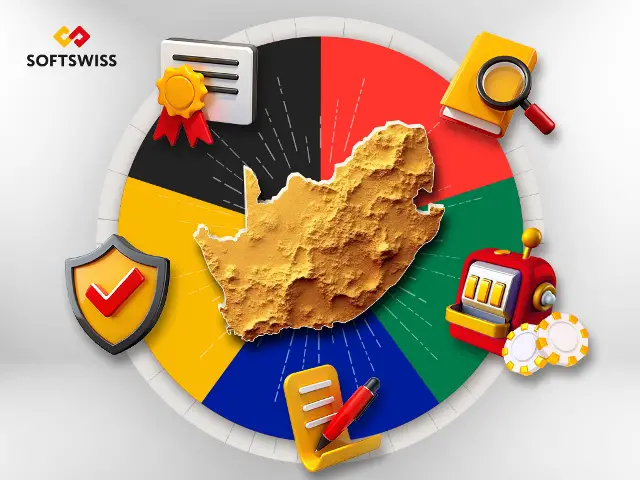Securing a gambling license in South Africa is crucial for operators looking to enter the country’s regulated iGaming market. The licensing framework managed at the provincial level, ensures that online and land-based gambling operations comply with stringent regulations aimed at fairness, transparency, and responsible gaming. For industry professionals like those at softswiss.com, who offer innovative iGaming solutions, navigating these regulations is essential for creating compliant platforms that meet the local standards.
Breaking Down the Application Process
Understanding how to obtain a gambling license in South Africa begins with recognizing that provincial gambling boards oversee the process. Each province operates independently, but the general steps remain consistent across regions.
1. Determine the License Type
Operators need to identify the type of license suited to their activities. Options include licenses for casinos, sports betting, and interactive gaming.
2. Choose a Province
The process varies by province, with Gauteng, Western Cape, and KwaZulu-Natal among the most sought-after jurisdictions. Operators must apply directly to the gambling board of their chosen province.
3. Prepare Documentation
Comprehensive documentation is required to demonstrate the operator’s financial stability, legal standing, and business capabilities. This includes:
- A detailed business plan outlining the nature and scope of the gambling operation.
- Financial records and audited statements.
- Technical specifications of the gaming platform.
4. Submit the Application
Applicants submit their documents along with the required application fee. It’s vital to ensure that all submissions are accurate and complete to avoid delays or rejections.
5. Background Checks and Inspections
The relevant gambling board will conduct background checks on stakeholders and review the technical and operational aspects of the business. Site inspections may also be required for land-based operations.
6. Approval and Licensing
Once approved, the operator receives their license, allowing them to begin operations within the province.
Gambling License Requirements
How to get a gambling license in South Africa involves meeting several key requirements. These are designed to ensure operators provide a safe, fair, and responsible gaming environment for players.
Financial and Legal Standing
Applicants must demonstrate sound financial health and provide evidence of legal compliance. This includes submitting financial records, tax clearance certificates, and proof of business registration.
Responsible Gambling Measures
Operators are required to implement tools for responsible gambling, such as deposit limits, self-exclusion options, and age verification systems. These measures protect players from the risks of problem gambling.
Technical Compliance
For online operations, gaming platforms must meet technical standards such as secure encryption, data protection, and certified random number generators (RNGs).
Anti-Money Laundering (AML) Policies
South African regulations mandate robust AML systems to prevent illegal activities such as money laundering or fraud.
How Much Does a Gambling License Cost?
The gambling license cost in South Africa varies by province and license type. Costs are generally divided into application fees, licensing fees, and annual renewal fees.
Application Fees
Non-refundable application fees typically range from ZAR 5,000 to ZAR 15,000, depending on the province and the scale of the operation.
Licensing Fees
Once approved, operators must pay licensing fees, which can range from ZAR 50,000 to ZAR 300,000. The exact amount is influenced by the nature of the business and the provincial board’s regulations.
Renewal Fees
Annual renewal fees are either a fixed amount or a percentage of the operator’s gross revenue. These fees ensure the continued legitimacy and compliance of the business.
Online Gambling License South Africa
Securing an online gambling license in South Africa involves additional considerations compared to land-based operations. Online operators must address unique challenges such as platform security, international payments, and user data protection.
Compliance with Provincial Laws
Each province has its own set of laws governing online gambling. Operators must tailor their applications to meet the specific requirements of their chosen jurisdiction.
Technical Requirements
Online gambling platforms must comply with technical regulations to ensure secure and fair gameplay. This includes robust cybersecurity measures, RNG certifications, and mobile compatibility.
Payment Solutions
Operators need to integrate secure payment gateways that support local and international transactions, offering convenience to players while complying with financial regulations.
How to Start an Online Business in South Africa
For entrepreneurs wondering how to start an online business in South Africa, the gambling sector presents a lucrative opportunity. Here are some foundational steps:
1. Business Registration
Register the business with the Companies and Intellectual Property Commission (CIPC) and obtain a tax clearance certificate from the South African Revenue Service (SARS).
2. Market Research
Understand the local gambling landscape, including player preferences, competitor strategies, and regulatory nuances.
3. Secure Funding
Starting an online gambling business requires significant investment in technology, licensing, and marketing. Ensure you have sufficient capital or access to funding sources.
4. Develop a Reliable Platform
Invest in a user-friendly gaming platform that meets all technical and regulatory requirements. Partnering with a provider like SOFTSWISS can streamline this process.
Read Also: UCL: We Suffered Against Atalanta –Ancelotti
5. Apply for a Gambling License
Follow the provincial licensing process, ensuring all documentation is complete and accurate.
Tips for a Successful Application
1. Engage Industry Experts
Working with consultants familiar with South Africa’s gambling laws can simplify the application process and increase the chances of success.
2. Focus on Compliance
Demonstrating a commitment to responsible gambling and regulatory compliance is key to gaining approval.
3. Prepare for Audits
Be ready for regulatory audits and inspections during and after the licensing process.
Common Mistakes to Avoid
1. Incomplete Documentation
Failing to provide all necessary documentation, such as financial records and operational details, can delay the application process.
2. Neglecting Responsible Gambling
Overlooking responsible gambling measures such as deposit limits or time-tracking tools can result in a rejected application.
3. Underestimating Costs
Apart from the initial application fees, ongoing costs like audits, system upgrades, and renewals should be accounted for.
Conclusion
Securing a gambling license in South Africa is a detailed and resource-intensive process, but it’s essential for establishing a legitimate and successful gambling business. From understanding the gambling license requirements to calculating the gambling license cost, operators must approach the process with diligence and professionalism. Leveraging expertise from trusted iGaming solution providers like SOFTSWISS can streamline operations, ensuring compliance and sustainability in this highly regulated market.
By following the outlined steps and adhering to the country’s strict regulatory framework, operators can unlock significant opportunities in South Africa’s thriving gambling sector.







